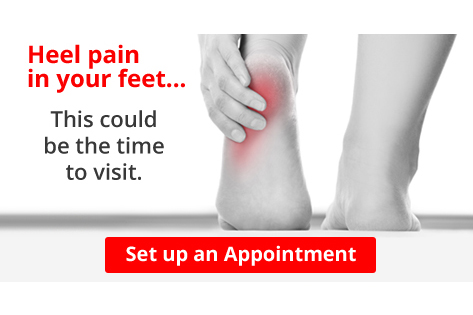Connect With Us
Blog
Bunions and Surgery
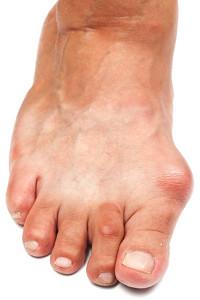 Bunions, if left untreated, can start to throb and become very painful. Does this mean that you should have surgery to treat your bunions before they start hurting? Not necessarily; there are plenty of nonsurgical options available to treat bunions and the associated pain. It is best to see a podiatrist first, however, as they can discuss the options available to you. Common conservative options include trying new pairs of shoes that offer more room and keep pressure off the bunion. Bunions pads are another readily available option that also help ease pressure on the bunion. Anti-inflammatory medication can provide temporary relief from pain and inflammation, and cortisone shots can help with that too. If conservative measures such as these do not ease pain, then surgery may be recommended by a podiatrist.
Bunions, if left untreated, can start to throb and become very painful. Does this mean that you should have surgery to treat your bunions before they start hurting? Not necessarily; there are plenty of nonsurgical options available to treat bunions and the associated pain. It is best to see a podiatrist first, however, as they can discuss the options available to you. Common conservative options include trying new pairs of shoes that offer more room and keep pressure off the bunion. Bunions pads are another readily available option that also help ease pressure on the bunion. Anti-inflammatory medication can provide temporary relief from pain and inflammation, and cortisone shots can help with that too. If conservative measures such as these do not ease pain, then surgery may be recommended by a podiatrist.
If you are suffering from bunions, contact Dr. Yeon A. Shim of Roselle Podiatry Group. Our doctor can provide the care you need to keep you pain-free and on your feet.
What Is a Bunion?
A bunion is formed of swollen tissue or an enlargement of boney growth, usually located at the base joint of the toe that connects to the foot. The swelling occurs due to the bones in the big toe shifting inward, which impacts the other toes of the foot. This causes the area around the base of the big toe to become inflamed and painful.
Why Do Bunions Form?
Genetics – Susceptibility to bunions are often hereditary
Stress on the feet – Poorly fitted and uncomfortable footwear that places stress on feet, such as heels, can worsen existing bunions
How Are Bunions Diagnosed?
Doctors often perform two tests – blood tests and x-rays – when trying to diagnose bunions, especially in the early stages of development. Blood tests help determine if the foot pain is being caused by something else, such as arthritis, while x-rays provide a clear picture of your bone structure to your doctor.
How Are Bunions Treated?
- Refrain from wearing heels or similar shoes that cause discomfort
- Select wider shoes that can provide more comfort and reduce pain
- Anti-inflammatory and pain management drugs
- Orthotics or foot inserts
- Surgery
If you have any questions, please feel free to contact our office located in Roselle, NJ. We offer the newest diagnostic and treatment technologies for all your foot care needs.
Read more about BunionsDealing With Heel Pain
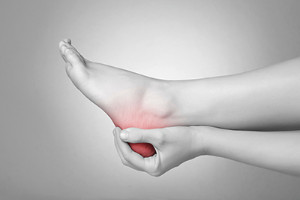 Plantar fasciitis, one of the most common causes of heel pain, is a condition that many people suffer from. Among those who do are runners and athletes, those who are overweight, and people who have to stand for extended periods of time. While not life-threatening, it can cause substantial pain and discomfort to those who experience it. Thankfully, there are some things that you can do to help alleviate the pain. First, rest your feet and avoid overexerting them in any strenuous activities that may have led to the heel pain. Second, ice your feet and use anti-inflammatory medications prescribed or recommended by a podiatrist. Some podiatrists may suggest some form of relatively light physical therapy to strengthen the feet, however this is not always recommended. Maintaining a healthy weight can also reduce the stress on the feet that could have led to heel pain. Finally, be sure to wear comfortable shoes that have good cushioning and support.
Plantar fasciitis, one of the most common causes of heel pain, is a condition that many people suffer from. Among those who do are runners and athletes, those who are overweight, and people who have to stand for extended periods of time. While not life-threatening, it can cause substantial pain and discomfort to those who experience it. Thankfully, there are some things that you can do to help alleviate the pain. First, rest your feet and avoid overexerting them in any strenuous activities that may have led to the heel pain. Second, ice your feet and use anti-inflammatory medications prescribed or recommended by a podiatrist. Some podiatrists may suggest some form of relatively light physical therapy to strengthen the feet, however this is not always recommended. Maintaining a healthy weight can also reduce the stress on the feet that could have led to heel pain. Finally, be sure to wear comfortable shoes that have good cushioning and support.
Many people suffer from bouts of heel pain. For more information, contact Dr. Yeon A. Shim of Roselle Podiatry Group. Our doctor can provide the care you need to keep you pain-free and on your feet.
Causes of Heel Pain
Heel pain is often associated with plantar fasciitis. The plantar fascia is a band of tissues that extends along the bottom of the foot. A rip or tear in this ligament can cause inflammation of the tissue.
Achilles tendonitis is another cause of heel pain. Inflammation of the Achilles tendon will cause pain from fractures and muscle tearing. Lack of flexibility is also another symptom.
Heel spurs are another cause of pain. When the tissues of the plantar fascia undergo a great deal of stress, it can lead to ligament separation from the heel bone, causing heel spurs.
Why Might Heel Pain Occur?
- Wearing ill-fitting shoes
- Wearing non-supportive shoes
- Weight change
- Excessive running
Treatments
Heel pain should be treated as soon as possible for immediate results. Keeping your feet in a stress-free environment will help. If you suffer from Achilles tendonitis or plantar fasciitis, applying ice will reduce the swelling. Stretching before an exercise like running will help the muscles. Using all these tips will help make heel pain a condition of the past.
If you have any questions please contact our office located in Roselle, NJ . We offer the newest diagnostic and treatment technologies for all your foot and ankle needs.
Dealing With Heel Pain
 Plantar fasciitis, one of the most common causes of heel pain, is a condition that many people suffer from. Among those who do are runners and athletes, those who are overweight, and people who have to stand for extended periods of time. While not life-threatening, it can cause substantial pain and discomfort to those who experience it. Thankfully, there are some things that you can do to help alleviate the pain. First, rest your feet and avoid overexerting them in any strenuous activities that may have led to the heel pain. Second, ice your feet and use anti-inflammatory medications prescribed or recommended by a podiatrist. Some podiatrists may suggest some form of relatively light physical therapy to strengthen the feet, however this is not always recommended. Maintaining a healthy weight can also reduce the stress on the feet that could have led to heel pain. Finally, be sure to wear comfortable shoes that have good cushioning and support.
Plantar fasciitis, one of the most common causes of heel pain, is a condition that many people suffer from. Among those who do are runners and athletes, those who are overweight, and people who have to stand for extended periods of time. While not life-threatening, it can cause substantial pain and discomfort to those who experience it. Thankfully, there are some things that you can do to help alleviate the pain. First, rest your feet and avoid overexerting them in any strenuous activities that may have led to the heel pain. Second, ice your feet and use anti-inflammatory medications prescribed or recommended by a podiatrist. Some podiatrists may suggest some form of relatively light physical therapy to strengthen the feet, however this is not always recommended. Maintaining a healthy weight can also reduce the stress on the feet that could have led to heel pain. Finally, be sure to wear comfortable shoes that have good cushioning and support.
Many people suffer from bouts of heel pain. For more information, contact Dr. Yeon A. Shim of Roselle Podiatry Group. Our doctor can provide the care you need to keep you pain-free and on your feet.
Causes of Heel Pain
Heel pain is often associated with plantar fasciitis. The plantar fascia is a band of tissues that extends along the bottom of the foot. A rip or tear in this ligament can cause inflammation of the tissue.
Achilles tendonitis is another cause of heel pain. Inflammation of the Achilles tendon will cause pain from fractures and muscle tearing. Lack of flexibility is also another symptom.
Heel spurs are another cause of pain. When the tissues of the plantar fascia undergo a great deal of stress, it can lead to ligament separation from the heel bone, causing heel spurs.
Why Might Heel Pain Occur?
- Wearing ill-fitting shoes
- Wearing non-supportive shoes
- Weight change
- Excessive running
Treatments
Heel pain should be treated as soon as possible for immediate results. Keeping your feet in a stress-free environment will help. If you suffer from Achilles tendonitis or plantar fasciitis, applying ice will reduce the swelling. Stretching before an exercise like running will help the muscles. Using all these tips will help make heel pain a condition of the past.
If you have any questions please contact our office located in Roselle, NJ. We offer the newest diagnostic and treatment technologies for all your foot and ankle needs.
Read more about Heel PainIt's Time for Beautiful Feet
When Choosing Children’s Footwear, Fit Comes Before Fashion
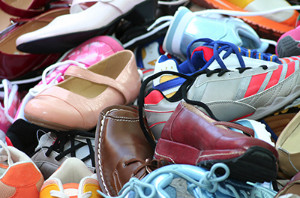 When it comes to choosing children’s footwear, children often favor style over comfort. This can cause a number of foot issues; children’s feet are still developing, and poorly fitted footwear can stymie growth. It is recommended to wear fitted shoes that not only offer some flexibility, but provide support and cushioning as well. The toes should have enough space to move around, and the foot shouldn’t be cramped. Too much space, however, is also bad and can lead to injury. Parents should keep an eye on their children’s feet; if they complain about foot pain, it may be wise to take them to a podiatrist. Fashion and style have their place in choosing footwear, but it shouldn’t be at the cost of healthy feet.
When it comes to choosing children’s footwear, children often favor style over comfort. This can cause a number of foot issues; children’s feet are still developing, and poorly fitted footwear can stymie growth. It is recommended to wear fitted shoes that not only offer some flexibility, but provide support and cushioning as well. The toes should have enough space to move around, and the foot shouldn’t be cramped. Too much space, however, is also bad and can lead to injury. Parents should keep an eye on their children’s feet; if they complain about foot pain, it may be wise to take them to a podiatrist. Fashion and style have their place in choosing footwear, but it shouldn’t be at the cost of healthy feet.
Making sure that your children maintain good foot health is very important as they grow. If you have any questions, contact Dr. Yeon A. Shim of Roselle Podiatry Group. Our doctor can provide the care you need to keep you pain-free and on your feet.
Keeping Children's Feet Healthy
Having healthy feet during childhood can help prevent medical problems later in life, namely in the back and legs. As children grow, their feet require different types of care. Here are some things to consider...
Although babies do not walk yet, it is still very important to take care of their feet.
Avoid putting tight shoes or socks on his or her feet.
Allow the baby to stretch and kick his or her feet to feel comfortable.
As a toddler, kids are now on the move and begin to develop differently. At this age, toddlers are getting a feel for walking, so don’t be alarmed if your toddler is unsteady or ‘walks funny’.
As your child gets older, it is important to teach them how to take care of their feet.
Show them proper hygiene to prevent infections such as fungus.
Be watchful for any pain or injury.
Have all injuries checked by a doctor as soon as possible.
Comfortable, protective shoes should always be worn, especially at play.
If you have any questions please feel free to contact our office located in Roselle, NJ . We offer the newest diagnostic and treatment technologies for all your foot and ankle needs.
When Choosing Children’s Footwear, Fit Comes Before Fashion
 When it comes to choosing children’s footwear, children often favor style over comfort. This can cause a number of foot issues; children’s feet are still developing, and poorly fitted footwear can stymie growth. It is recommended to wear fitted shoes that not only offer some flexibility, but provide support and cushioning as well. The toes should have enough space to move around, and the foot shouldn’t be cramped. Too much space, however, is also bad and can lead to injury. Parents should keep an eye on their children’s feet; if they complain about foot pain, it may be wise to take them to a podiatrist. Fashion and style have their place in choosing footwear, but it shouldn’t be at the cost of healthy feet.
When it comes to choosing children’s footwear, children often favor style over comfort. This can cause a number of foot issues; children’s feet are still developing, and poorly fitted footwear can stymie growth. It is recommended to wear fitted shoes that not only offer some flexibility, but provide support and cushioning as well. The toes should have enough space to move around, and the foot shouldn’t be cramped. Too much space, however, is also bad and can lead to injury. Parents should keep an eye on their children’s feet; if they complain about foot pain, it may be wise to take them to a podiatrist. Fashion and style have their place in choosing footwear, but it shouldn’t be at the cost of healthy feet.
Making sure that your children maintain good foot health is very important as they grow. If you have any questions, contact Dr. Yeon A. Shim of Roselle Podiatry Group. Our doctor can provide the care you need to keep you pain-free and on your feet.
Keeping Children's Feet Healthy
Having healthy feet during childhood can help prevent medical problems later in life, namely in the back and legs. As children grow, their feet require different types of care. Here are some things to consider...
Although babies do not walk yet, it is still very important to take care of their feet.
Avoid putting tight shoes or socks on his or her feet.
Allow the baby to stretch and kick his or her feet to feel comfortable.
As a toddler, kids are now on the move and begin to develop differently. At this age, toddlers are getting a feel for walking, so don’t be alarmed if your toddler is unsteady or ‘walks funny’.
As your child gets older, it is important to teach them how to take care of their feet.
Show them proper hygiene to prevent infections such as fungus.
Be watchful for any pain or injury.
Have all injuries checked by a doctor as soon as possible.
Comfortable, protective shoes should always be worn, especially at play.
If you have any questions please feel free to contact our office located in Roselle, NJ. We offer the newest diagnostic and treatment technologies for all your foot and ankle needs.
Read more about What to Do to Keep Your Child’s Feet HealthyArsenal Forward Suffers Ankle Injury
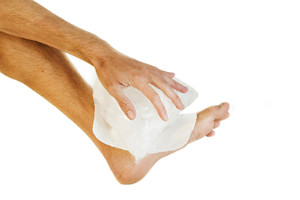 Arsenal Football Club forward Alexis Sanchez recently sustained an ankle injury while training with the Chilean soccer team. He was seen leaving the training field with an ice pack on his left ankle. Sanchez is currently being monitored by medical personnel, but they are confident he can play past the pain. Arsenal has lost several games already; potentially losing one of their best players will be a tough blow to the Gunners.
Arsenal Football Club forward Alexis Sanchez recently sustained an ankle injury while training with the Chilean soccer team. He was seen leaving the training field with an ice pack on his left ankle. Sanchez is currently being monitored by medical personnel, but they are confident he can play past the pain. Arsenal has lost several games already; potentially losing one of their best players will be a tough blow to the Gunners.
Sports related foot and ankle injuries require proper treatment before players can go back to their regular routines. For more information, contact Dr. Yeon A. Shim of Roselle Podiatry Group. Our doctor can provide the care you need to keep you pain-free and on your feet.
Sports Related Foot and Ankle Injuries
Foot and ankle injuries are a common occurrence when it comes to athletes of any sport. While many athletes dismiss the initial aches and pains, the truth is that ignoring potential foot and ankle injuries can lead to serious problems. As athletes continue to place pressure and strain the area further, a mild injury can turn into something as serious as a rupture and may lead to a permanent disability. There are many factors that contribute to sports related foot and ankle injuries, which include failure to warm up properly, not providing support or wearing bad footwear. Common injuries and conditions athletes face, including:
- Plantar Fasciitis
- Plantar Fasciosis
- Achilles Tendinitis
- Achilles Tendon Rupture
- Ankle Sprains
Sports related injuries are commonly treated using the RICE method. This includes rest, applying ice to the injured area, compression and elevating the ankle. More serious sprains and injuries may require surgery, which could include arthroscopic and reconstructive surgery. Rehabilitation and therapy may also be required in order to get any recovering athlete to become fully functional again. Any unusual aches and pains an athlete sustains must be evaluated by a licensed, reputable medical professional.
If you have any questions please feel free to contact our office located in Roselle, NJ . We offer the newest diagnostic and treatment technologies for all your foot and ankle needs.
Arsenal Forward Suffers Ankle Injury
 Arsenal Football Club forward Alexis Sanchez recently sustained an ankle injury while training with the Chilean soccer team. He was seen leaving the training field with an ice pack on his left ankle. Sanchez is currently being monitored by medical personnel, but they are confident he can play past the pain. Arsenal has lost several games already; potentially losing one of their best players will be a tough blow to the Gunners.
Arsenal Football Club forward Alexis Sanchez recently sustained an ankle injury while training with the Chilean soccer team. He was seen leaving the training field with an ice pack on his left ankle. Sanchez is currently being monitored by medical personnel, but they are confident he can play past the pain. Arsenal has lost several games already; potentially losing one of their best players will be a tough blow to the Gunners.
Sports related foot and ankle injuries require proper treatment before players can go back to their regular routines. For more information, contact Dr. Yeon A. Shim of Roselle Podiatry Group. Our doctor can provide the care you need to keep you pain-free and on your feet.
Sports Related Foot and Ankle Injuries
Foot and ankle injuries are a common occurrence when it comes to athletes of any sport. While many athletes dismiss the initial aches and pains, the truth is that ignoring potential foot and ankle injuries can lead to serious problems. As athletes continue to place pressure and strain the area further, a mild injury can turn into something as serious as a rupture and may lead to a permanent disability. There are many factors that contribute to sports related foot and ankle injuries, which include failure to warm up properly, not providing support or wearing bad footwear. Common injuries and conditions athletes face, including:
- Plantar Fasciitis
- Plantar Fasciosis
- Achilles Tendinitis
- Achilles Tendon Rupture
- Ankle Sprains
Sports related injuries are commonly treated using the RICE method. This includes rest, applying ice to the injured area, compression and elevating the ankle. More serious sprains and injuries may require surgery, which could include arthroscopic and reconstructive surgery. Rehabilitation and therapy may also be required in order to get any recovering athlete to become fully functional again. Any unusual aches and pains an athlete sustains must be evaluated by a licensed, reputable medical professional.
If you have any questions please feel free to contact our office located in Roselle, NJ. We offer the newest diagnostic and treatment technologies for all your foot and ankle needs.
Read more about Sports Related Foot And Ankle InjuriesShould You Wear High Heels if Pregnant?
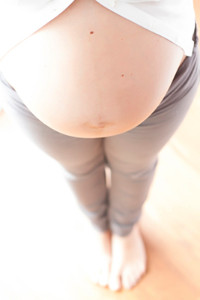 While high heels are considered to be fashionable by a number of people, they present a number of health issues to women’s feet. High heels can exacerbate conditions like bunions and lead to hammertoes, foot pain, and more. They can also be difficult to walk in and potentially cause women to fall. That said, should women wear high heels while pregnant? The additional weight of the baby can throw off a woman’s balance when walking in high heels. While the womb is well protected with thick walls and fluid that acts as a cushion, a fall can happen anywhere and can be very serious. The later a woman is in pregnancy, the more likely a fall has the potential to put a woman into labor. It is advised to avoid high heels during the later stages of pregnancy and to take caution during early pregnancy. It’s also good to consult a podiatrist whether high heels are right for you if you’re pregnant.
While high heels are considered to be fashionable by a number of people, they present a number of health issues to women’s feet. High heels can exacerbate conditions like bunions and lead to hammertoes, foot pain, and more. They can also be difficult to walk in and potentially cause women to fall. That said, should women wear high heels while pregnant? The additional weight of the baby can throw off a woman’s balance when walking in high heels. While the womb is well protected with thick walls and fluid that acts as a cushion, a fall can happen anywhere and can be very serious. The later a woman is in pregnancy, the more likely a fall has the potential to put a woman into labor. It is advised to avoid high heels during the later stages of pregnancy and to take caution during early pregnancy. It’s also good to consult a podiatrist whether high heels are right for you if you’re pregnant.
Pregnant women with swollen feet can be treated with a variety of different methods that are readily available. For more information about other cures for swollen feet during pregnancy, consult with Dr. Yeon A. Shim from Roselle Podiatry Group. Our doctor will attend to all of your foot and ankle needs.
What Foot Problems Can Arise During Pregnancy?
One problem that can occur is overpronation, which occurs when the arch of the foot flattens and tends to roll inward. This can cause pain and discomfort in your heels while you’re walking or even just standing up, trying to support your baby.
Another problem is edema, or swelling in the extremities. This often affects the feet during pregnancy but tends to occur in the later stages.
How Can I Keep My Feet Healthy During Pregnancy?
- Wearing orthotics can provide extra support for the feet and help distribute weight evenly
- Minimize the amount of time spent walking barefoot
- Wear shoes with good arch support
- Wear shoes that allow for good circulation to the feet
- Elevate feet if you experience swelling
- Massage your feet
- Get regular, light exercise, such as walking, to promote blood circulation to the feet
If you have any questions please feel free to contact our office located in Roselle, NJ . We offer the newest diagnostic and treatment technologies for all your foot and ankle needs.
Should You Wear High Heels if Pregnant?
 While high heels are considered to be fashionable by a number of people, they present a number of health issues to women’s feet. High heels can exacerbate conditions like bunions and lead to hammertoes, foot pain, and more. They can also be difficult to walk in and potentially cause women to fall. That said, should women wear high heels while pregnant? The additional weight of the baby can throw off a woman’s balance when walking in high heels. While the womb is well protected with thick walls and fluid that acts as a cushion, a fall can happen anywhere and can be very serious. The later a woman is in pregnancy, the more likely a fall has the potential to put a woman into labor. It is advised to avoid high heels during the later stages of pregnancy and to take caution during early pregnancy. It’s also good to consult a podiatrist whether high heels are right for you if you’re pregnant.
While high heels are considered to be fashionable by a number of people, they present a number of health issues to women’s feet. High heels can exacerbate conditions like bunions and lead to hammertoes, foot pain, and more. They can also be difficult to walk in and potentially cause women to fall. That said, should women wear high heels while pregnant? The additional weight of the baby can throw off a woman’s balance when walking in high heels. While the womb is well protected with thick walls and fluid that acts as a cushion, a fall can happen anywhere and can be very serious. The later a woman is in pregnancy, the more likely a fall has the potential to put a woman into labor. It is advised to avoid high heels during the later stages of pregnancy and to take caution during early pregnancy. It’s also good to consult a podiatrist whether high heels are right for you if you’re pregnant.
Pregnant women with swollen feet can be treated with a variety of different methods that are readily available. For more information about other cures for swollen feet during pregnancy, consult with Dr. Yeon A. Shim from Roselle Podiatry Group. Our doctor will attend to all of your foot and ankle needs.
What Foot Problems Can Arise During Pregnancy?
One problem that can occur is overpronation, which occurs when the arch of the foot flattens and tends to roll inward. This can cause pain and discomfort in your heels while you’re walking or even just standing up, trying to support your baby.
Another problem is edema, or swelling in the extremities. This often affects the feet during pregnancy but tends to occur in the later stages.
How Can I Keep My Feet Healthy During Pregnancy?
- Wearing orthotics can provide extra support for the feet and help distribute weight evenly
- Minimize the amount of time spent walking barefoot
- Wear shoes with good arch support
- Wear shoes that allow for good circulation to the feet
- Elevate feet if you experience swelling
- Massage your feet
- Get regular, light exercise, such as walking, to promote blood circulation to the feet
If you have any questions please feel free to contact our office located in Roselle, NJ. We offer the newest diagnostic and treatment technologies for all your foot and ankle needs.
Read more about Pregnancy and Foot HealthMore...
Heel Pain Can Be Treated!
Heel Pain Can be Treated!
Shower Shoes Help Prevent Foot Infections in Public Showers
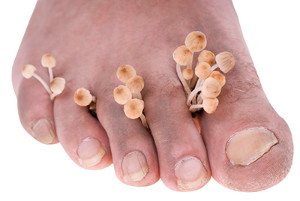 A word of advice to college students and gym goers: if you’re going to use a public shower, make sure to use shower shoes. Fungi and viruses can be present in public showers. Both can cause conditions like athlete’s foot, toenail fungus, and plantar warts. Athlete’s foot is a fungal infection of the foot; symptoms include itchiness, redness, and rough skin. The fungus can also spread and cause yellow or brownish toenails. Plantar warts are caused by human papillomavirus (HPV) and affect the bottoms of the feet. Thankfully, all of these conditions can be cured by a podiatrist.
A word of advice to college students and gym goers: if you’re going to use a public shower, make sure to use shower shoes. Fungi and viruses can be present in public showers. Both can cause conditions like athlete’s foot, toenail fungus, and plantar warts. Athlete’s foot is a fungal infection of the foot; symptoms include itchiness, redness, and rough skin. The fungus can also spread and cause yellow or brownish toenails. Plantar warts are caused by human papillomavirus (HPV) and affect the bottoms of the feet. Thankfully, all of these conditions can be cured by a podiatrist.
Everyday foot care is very important to prevent infection and other foot ailments. If you need your feet checked, contact Dr. Yeon A. Shim from Roselle Podiatry Group. Our doctor can provide the care you need to keep you pain-free and on your feet.
Everyday Foot Care
Often, people take care of their bodies, face and hair more so than they do for their feet. But the feet are a very important aspect of our bodies, and one that we should pay more attention to. Without our feet, we would not be able to perform most daily tasks.
It is best to check your feet regularly to make sure there are no new bruises or cuts that you may not have noticed before. For dry feet, moisturizer can easily be a remedy and can be applied as often as necessary to the affected areas. Wearing shoes that fit well can also help you maintain good foot health, as well as making it easier to walk and do daily activities without the stress or pain of ill-fitting shoes, high heels, or even flip flops. Wearing clean socks with closed shoes is important to ensure that sweat and bacteria do not accumulate within the shoe. Clean socks help to prevent Athlete’s foot, fungi problems, bad odors, and can absorb sweat.
If you have any questions please feel free to contact our office located in Roselle, NJ . We offer the newest diagnostic and treatment technologies for all your foot and ankle needs.
Shower Shoes Help Prevent Foot Infections in Public Showers
 A word of advice to college students and gym goers: if you’re going to use a public shower, make sure to use shower shoes. Fungi and viruses can be present in public showers. Both can cause conditions like athlete’s foot, toenail fungus, and plantar warts. Athlete’s foot is a fungal infection of the foot; symptoms include itchiness, redness, and rough skin. The fungus can also spread and cause yellow or brownish toenails. Plantar warts are caused by human papillomavirus (HPV) and affect the bottoms of the feet. Thankfully, all of these conditions can be cured by a podiatrist.
A word of advice to college students and gym goers: if you’re going to use a public shower, make sure to use shower shoes. Fungi and viruses can be present in public showers. Both can cause conditions like athlete’s foot, toenail fungus, and plantar warts. Athlete’s foot is a fungal infection of the foot; symptoms include itchiness, redness, and rough skin. The fungus can also spread and cause yellow or brownish toenails. Plantar warts are caused by human papillomavirus (HPV) and affect the bottoms of the feet. Thankfully, all of these conditions can be cured by a podiatrist.
Everyday foot care is very important to prevent infection and other foot ailments. If you need your feet checked, contact Dr. Yeon A. Shim from Roselle Podiatry Group. Our doctor can provide the care you need to keep you pain-free and on your feet.
Everyday Foot Care
Often, people take care of their bodies, face and hair more so than they do for their feet. But the feet are a very important aspect of our bodies, and one that we should pay more attention to. Without our feet, we would not be able to perform most daily tasks.
It is best to check your feet regularly to make sure there are no new bruises or cuts that you may not have noticed before. For dry feet, moisturizer can easily be a remedy and can be applied as often as necessary to the affected areas. Wearing shoes that fit well can also help you maintain good foot health, as well as making it easier to walk and do daily activities without the stress or pain of ill-fitting shoes, high heels, or even flip flops. Wearing clean socks with closed shoes is important to ensure that sweat and bacteria do not accumulate within the shoe. Clean socks help to prevent Athlete’s foot, fungi problems, bad odors, and can absorb sweat.
If you have any questions please feel free to contact our office located in Roselle, NJ. We offer the newest diagnostic and treatment technologies for all your foot and ankle needs.
Read more about Every Day Foot Care

